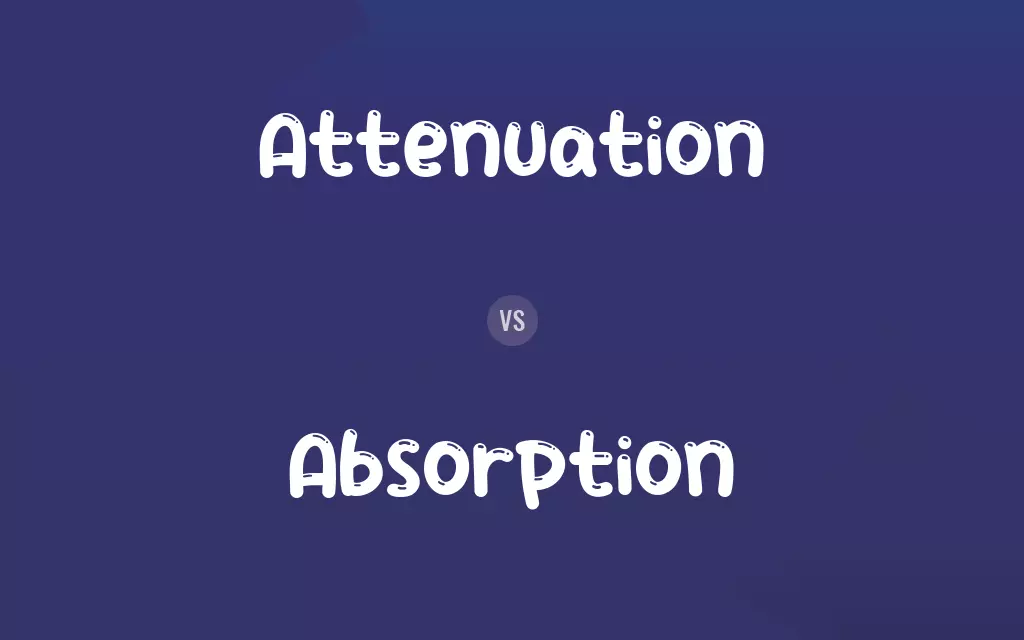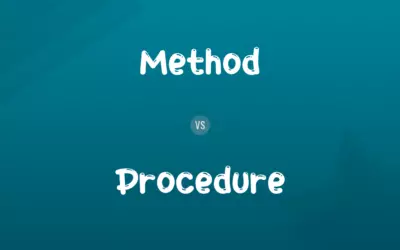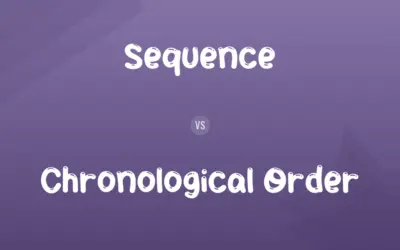Attenuation vs. Absorption: Difference and Comparison
By Muazma Batool & Muneeza Rehman — Updated on February 22, 2024
Attenuation involves the reduction in force or intensity, often of energy or sound waves as they travel through a medium. Absorption refers to the process by which a substance takes in another substance or energy.

Difference Between Attenuation and Absorption
Attenuation and absorption are both processes that affect how energy, such as sound or light, interacts with materials, but they operate through different mechanisms. Attenuation encompasses the overall reduction in energy intensity due to scattering, absorption, and reflection as the energy moves through a medium. Absorption, on the other hand, is a specific process within attenuation where the energy is taken in by the material and transformed, often into heat or another form of energy, without reflecting or transmitting it.
Muazma Batool
Feb 22, 2024
Attenuation can be observed in various contexts, including sound traveling through air or light passing through glass, it's a broader concept that includes multiple processes including absorption. Absorption is more narrowly defined, focusing on the conversion of the energy into a different form within the material. This distinction is crucial in fields like acoustics, optics, and materials science, where understanding the nuances between these processes helps in designing materials and systems.
Muazma Batool
Feb 22, 2024
In terms of application, attenuation is a critical concept in telecommunications, where signal strength reduces over distance or through media, necessitating amplifiers or repeaters. Absorption, however, is a key consideration in designing materials for insulation or soundproofing, where the goal is to convert the incoming energy to minimize transmission.
Muazma Batool
Feb 22, 2024
The measurement of attenuation often involves understanding the extent of energy reduction as it passes through a medium, quantified in units like decibels. For absorption, the focus is on the absorptivity or the efficiency with which a material can convert the incoming energy into another form, often related to the material's physical and chemical properties.
Muazma Batool
Feb 22, 2024
Understanding the difference between attenuation and absorption is vital for effectively managing energy interactions in various applications. For example, in designing a building for acoustics, one might choose materials that primarily absorb sound to minimize echo (absorption) while also considering the overall reduction in sound intensity through the structure (attenuation).
Levi
Feb 22, 2024
Attenuation vs. Absorption Comparison Chart
Definition
The reduction in force or intensity of energy as it passes through a medium.
The process by which a material takes in energy or substance, converting it.
Muazma Batool
Feb 22, 2024
Mechanism
Involves scattering, reflection, and absorption.
Specifically involves converting energy into another form.
Muazma Batool
Feb 22, 2024
Applications
Telecommunications, acoustics, optics.
Insulation, soundproofing, materials design.
Muazma Batool
Feb 22, 2024
Measurement
Quantified by the degree of intensity reduction, often in decibels.
Focused on absorptivity or efficiency of conversion.
Muazma Batool
Feb 22, 2024
Purpose
To understand and manage energy reduction through media.
To design materials that efficiently convert energy forms.
Muazma Batool
Feb 22, 2024
Attenuation vs. Absorption Definitions
◉Attenuation
Critical in telecommunications for managing signal loss.
Attenuation in phone lines can lead to the need for signal amplification.
Jonathan
Feb 22, 2024
◉Absorption
Key in designing insulation and soundproofing materials.
Absorption of sound by acoustic panels is critical for reducing noise in recording studios.
Muazma Batool
Feb 22, 2024
◉Attenuation
Measured in units like decibels to quantify energy reduction.
The engineer measured the signal attenuation over the length of the cable to assess its quality.
Lucas
Feb 22, 2024
◉Absorption
Measured by absorptivity or efficiency of energy conversion.
Research on new materials focuses on increasing light absorption for better solar cell efficiency.
Henry
Feb 22, 2024
◉Attenuation
Reduction of energy intensity through a medium.
Attenuation of the ultrasound waves in tissue is a critical consideration in medical imaging.
Muazma Batool
Feb 22, 2024
◉Absorption
Specifically involves the transformation of energy into heat or other forms.
The black fabric absorbs more sunlight, converting it into heat more efficiently than lighter colors.
Muazma Batool
Feb 22, 2024
◉Attenuation
Involves scattering, absorption, and reflection processes.
Fiber optic cables are designed to minimize light attenuation for efficient data transmission.
Muazma Batool
Feb 22, 2024
◉Absorption
Depends on the material's physical and chemical properties.
The absorption of chemicals by a sponge is influenced by its porosity and surface area.
Muazma Batool
Feb 22, 2024
◉Attenuation
Affects sound, light, and other forms of energy.
Attenuation of sound waves is crucial in designing concert halls for optimal acoustics.
Jonathan
Feb 22, 2024
◉Absorption
Energy is taken in and converted by a material.
The absorption of sunlight by solar panels is essential for converting light to electricity.
Muazma Batool
Feb 22, 2024
◉Attenuation
To make slender, fine, or small
The drought attenuated the river to a narrow channel.
Muazma Batool
May 03, 2023
◉Absorption
The act or process of absorbing or the condition of being absorbed.
Muazma Batool
May 03, 2023
Attenuation vs. Absorption Frequently Asked Questions
Can attenuation occur without absorption?
Yes, attenuation can occur through processes like scattering and reflection without absorption, though absorption is a common cause of attenuation.
Muazma Batool
Feb 22, 2024
How does absorption work?
Absorption involves a material taking in energy and converting it into another form, such as light into heat, based on the material's properties.
Muazma Batool
Feb 22, 2024
Can the same material exhibit both attenuation and absorption?
Yes, many materials exhibit both processes, with absorption being a form of attenuation and contributing to the overall reduction in energy intensity.
Kaitlyn
Feb 22, 2024
How do materials designed for absorption work?
Materials designed for absorption are engineered to maximize energy conversion efficiency, often tailored for specific types of energy like sound or light.
Olivia
Feb 22, 2024
What role does absorption play in soundproofing?
Absorption is key in soundproofing, as materials that absorb sound energy can significantly reduce noise transmission by converting it into heat.
Muazma Batool
Feb 22, 2024
How do absorption and attenuation differ in optics?
In optics, attenuation refers to the reduction of light intensity through scattering and absorption, while absorption specifically involves the light being converted by the material, affecting how materials are chosen for lenses or filters.
Muazma Batool
Feb 22, 2024
What is attenuation in simple terms?
Attenuation is the process of energy diminishing in intensity as it travels through a medium, affecting sound, light, and other energy forms.
Muazma Batool
Feb 22, 2024
Why is attenuation important in telecommunications?
Attenuation affects the signal strength over distance, making it essential to understand and mitigate in telecommunications for clear communication.
Muazma Batool
Feb 22, 2024
How is absorption used in environmental science?
Absorption processes are critical in environmental science, such as in the absorption of pollutants by filters or the absorption of carbon dioxide by plants.
William
Feb 22, 2024
What factors affect attenuation?
Factors include the medium's properties, distance the energy travels, and the energy form itself (e.g., sound waves vs. electromagnetic waves).
Lucas
Feb 22, 2024
Content Creators
Written by
Muazma BatoolAs a content editor, Muazma Batool is not just a grammar guru but a creative mastermind who breathes life into every word. With an eagle eye for detail and a passion for storytelling, she transforms bland text into engaging content that captivates audiences and drives results.
Co-written by
Muneeza RehmanAt Comparisons.wiki, Muneeza skillfully navigates the vast sea of information, ensuring clarity and accuracy as the lead content editor. With a keen eye for detail, she curates every comparison to enlighten and engage readers.

































